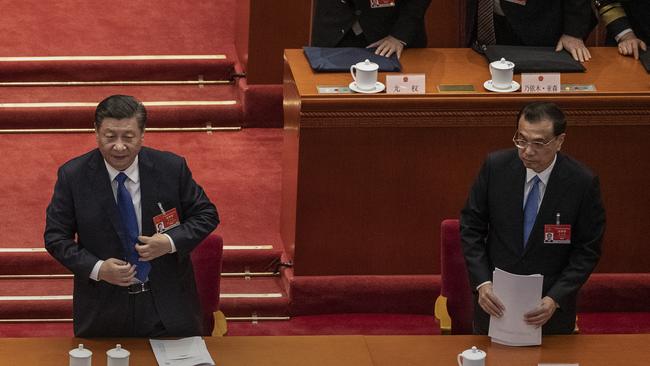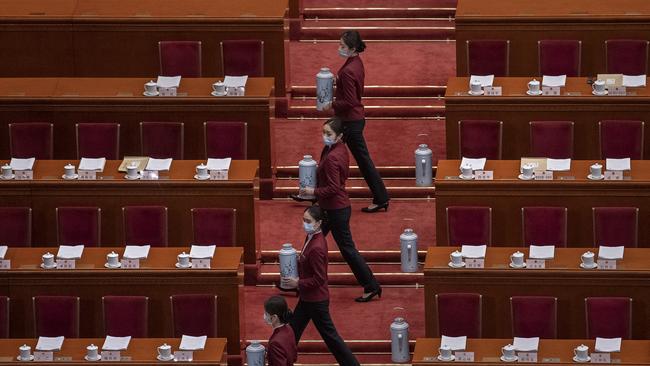Xi tells China’s military ‘be prepared to respond’
China’s leader was speaking days before leaders of the Quadrilateral Security Dialogue meet at a virtual summit.

President Xi Jinping has told China’s military to “be prepared to respond” and focus on “combat readiness” days before a leaders’ meeting of the Quad.
Mr Xi, who is also the chair of the Central Military Commission, told armed forces representatives that China’s current security situation was “largely unstable and uncertain”.
“The entire military must co-ordinate the relationship between capacity building and combat readiness, be prepared to respond to a variety of complex and difficult situations at any time, (and) resolutely safeguard national sovereignty, security and development interests,” Mr Xi said at a military session at the National People’s Congress, China’s most important annual political meeting.
China’s leader was speaking days before leaders of the Quadrilateral Security Dialogue — America’s President Joe Biden, Indian Prime Minister Narendra Modi, Japanese Prime Minister Yoshihide Suga and Australian Prime Minister Scott Morrison — meet at a virtual summit on Friday.
Increased co-ordination of the Quad countries on security matters has angered Beijing, which accuses the grouping of trying to contain China.
The leaders will meet nine months after a border conflict last June between China and India — which killed 20 Indian soldiers and four Chinese — and heightened security concerns in New Delhi, the Quad’s most cautious member.
Mr Xi has made modernising the People’s Liberation Army a priority since taking over as the general secretary of the Chinese Communist Party in 2012.
Last week, China revealed it would increase its official defence budget by 6.8 per cent to $270bn in 2021. That amount is about four times the defence budgets of India and Japan respectively, but just over a quarter of America’s military spending.
Australia’s total defence budget for 2020-21 was about $42bn.
On Tuesday, Mr Xi also instructed his defence officials to focus on technological innovation, a key priority as China tries to increase its resilience following sweeping tech sanctions imposed by the US.

China last week committed to spending more than 7 per cent in the next five years on research and development. A draft of its 14th Five-Year Plan (2021-25) and long range goals through to 2035 — a key planning document for China’s future, released during the political gathering — include the development of artificial intelligence, quantum computing, and “deep space, deep earth, deep sea and polar exploration”.
Mr Xi’s remarks came after China’s Defence Minister, General Wei Fenghe, on Saturday said the country needed to improve its capability so it could “prevail over our strong enemies”.
“The great rejuvenation of the Chinese nation is at a critical stage where we are facing unprecedented opportunities as well as unprecedented challenges,” General Wei said on the sidelines of the political gathering in Beijing.
He warned US containment efforts would “last throughout the process of China’s national rejuvenation”.
On Wednesday AEDT, Washington’s top military officer in the Indo-Pacific warned that China could invade Taiwan within the next six years, a timeframe increasingly concerning analysts.
“I worry that they’re (China) accelerating their ambitions to supplant the United States and our leadership role in the rules-based international order ... by 2050,” Admiral Philip Davidson told a US Senate committee.
“Taiwan is clearly one of their ambitions before that. And I think the threat is manifest during this decade, in fact, in the next six years.”
China considers Taiwan a breakaway province and has called its return a key part of “national rejuvenation”.
Admiral Davidson’s Indo-Pacific command has recently asked the US congress to increase its spending to a combined $US27.4bn over the next six years.
Among the US Indo-Pacific command’s proposals are a network of precision-strike missiles on the island chain off China’s coast. The US has more than 132,000 troops stationed in the Indo-Pacific.
While acknowledging threats in the international outlook, Mr Xi has also used the seven-day-long political meeting — which ends on Thursday — to project China’s increased confidence after its handling of the coronavirus.
“Now, when our young people go abroad, they can stand tall and feel proud — unlike us when we were young,” Mr Xi told a group of China’s health advisers over the weekend, according to the Chinese Communist Party-controlled People’s Daily.




To join the conversation, please log in. Don't have an account? Register
Join the conversation, you are commenting as Logout